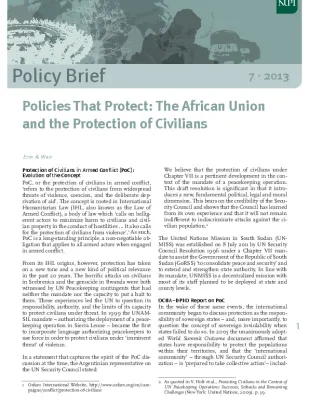"Protection of Civilians in Armed Conflict (PoC): Evolution of the Concept PoC, or the protection of civilians in armed conflict, ‘refers to the protection of civilians from widespread threats of violence, coercion, and the deliberate deprivation of aid’. The concept is rooted in International Humanitarian Law (IHL, also known as the Law of Armed Conflict), a body of law which ‘calls on belligerent actors to minimize harm to civilians and civilian property in the conduct of hostilities ... It also calls for the protection of civilians from violence’.1 As such, PoC is a long-standing principle, a non-negotiable obligation that applies to all armed actors when engaged in armed conflict. From its IHL origins, however, protection has taken on a new tone and a new kind of political relevance in the past 20 years. The horrific attacks on civilians in Srebrenica and the genocide in Rwanda were both witnessed by UN Peacekeeping contingents that had neither the mandate nor the capacity to put a halt to them. These experiences led the UN to question its responsibility, authority, and the limits of its capacity to protect civilians under threat. In 1999 the UNAMSIL mandate – authorizing the deployment of a peacekeeping operation in Sierra Leone – became the first to incorporate language authorizing peacekeepers to use force in order to protect civilians under ‘imminent threat’ of violence. In a statement that captures the spirit of the PoC discussion at the time, the Argentinian representative on the UN Security Council stated:We believe that the protection of civilians under Chapter VII is a pertinent development in the context of the mandate of a peacekeeping operation. This draft resolution is significant in that it introduces a new, fundamental political, legal and moral dimension. This bears on the credibility of the Security Council and shows that the Council has learned from its own experience and that it will not remain indifferent to indiscriminate attacks against the civilian population.2 The United Nations Mission in South Sudan (UNMISS) was established on 8 July 2011 by UN Security Council Resolution 1996 under a Chapter VII mandate to assist the Government of the Republic of South Sudan (GoRSS) ‘to consolidate peace and security’ and to extend and strengthen state authority. In line with its mandate, UNMISS is a decentralized mission with most of its staff planned to be deployed at state and county levels. "
Publisher(s)
Publication year
2013
Abstract
ACCESS
File
Document
RS596_191554.pdf
(757.72 KB)
Access
“Open” means that the resource is available to view, but please check the weblink for restrictions on use. “Restricted” means that the resource is not openly accessible to all, but you can purchase a copy, or your organisation might have an institutional subscription.
Source
Norwegian Institute of International Affairs, (NUPI) Policy Brief 7 · 2013
FURTHER INFORMATION
Keywords
Organisation(s)
Language(s)
